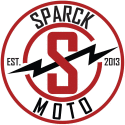We noticed you are blocking ads. DO THE TON only works with community supporters. Most are active members of the site with small businesses. Please consider disabling your ad blocking tool and checking out the businesses that help keep our site up and free.
You are using an out of date browser. It may not display this or other websites correctly.
You should upgrade or use an alternative browser.
You should upgrade or use an alternative browser.
Drilling drum brakes
- Thread starter AgentX
- Start date
AlphaDogChoppers
Science is true whether you believe in it or not.
Cooling holes in a brake drum is mostly for looks, IMO. Other than possibly weakening the hub as a whole, they allow water to get in there more easily. Water entry would not deter me much.
my-79-750-k
Therapy is expensive. Riding is cheap. You decide.
...or join everyone else in the 21st century and get disc brakes. ;D
neevo
Over 1,000 Posts
Jewbacca said:...or join everyone else in the 21st century and get disc brakes. ;D
Big discs up front on the business end and pretty drum up the back is a good idea in my books. Back doesn't do a wealth of stopping anyway.
AgentX
Over 1,000 Posts
Yeah, was just curious--all the negatives mentioned seemed probable to me. Definitely don't want to kill wet-weather performance. I was just interested in maximizing cooling while I was doing work on the wheels anyhow.
I'm actually considering the disc option. It's relatively cheap to swap out over here. I think the kit is like 7000 rupees, which comes to $140 US including the hub, fork sliders, and brake. Probably need a few bucks for a new fender too.
I'll keep my drum on over here but might swap in the disc kit when I rebuild the bike in the States.
I am just looking at the amount of work and cost needed to keep a drum brake working well (wanted the full vintagebrake.com shoe lining setup, plus arcing/turning) and thinking disc is really the way to go, even though these Enfield disc setups aren't spectacular themselves.
Maybe upgrading the disc brake pads would help. The drum really does look cool, though, especially if lightly polished with some enamel between the fins.
I'm actually considering the disc option. It's relatively cheap to swap out over here. I think the kit is like 7000 rupees, which comes to $140 US including the hub, fork sliders, and brake. Probably need a few bucks for a new fender too.
I'll keep my drum on over here but might swap in the disc kit when I rebuild the bike in the States.
I am just looking at the amount of work and cost needed to keep a drum brake working well (wanted the full vintagebrake.com shoe lining setup, plus arcing/turning) and thinking disc is really the way to go, even though these Enfield disc setups aren't spectacular themselves.
Maybe upgrading the disc brake pads would help. The drum really does look cool, though, especially if lightly polished with some enamel between the fins.
AgentX
Over 1,000 Posts
Fat Willy said:Just be careful. There are ribs on the inside for a reason.
Her pleasure?
mydlyfkryzis
当有疑问时踢你的敌人在生殖器上,你可以道歉后
If you aren't racing, I doubt you will ever heat the rear drum brake up enough that cooling holes will make a difference.
And if you are going real fast, a hard application unloads the rear tire, so that very little braking effort can be used in the rear only.
Better to spend the money and time on getting the front brakes optimized.
And if you are going real fast, a hard application unloads the rear tire, so that very little braking effort can be used in the rear only.
Better to spend the money and time on getting the front brakes optimized.
AgentX
Over 1,000 Posts
mydlyfkryzis said:If you aren't racing, I doubt you will ever heat the rear drum brake up enough that cooling holes will make a difference.
And if you are going real fast, a hard application unloads the rear tire, so that very little braking effort can be used in the rear only.
Better to spend the money and time on getting the front brakes optimized.
Not that I'm likely going to drill anything, but I was talking about my front brake...agree with you 100%.
mydlyfkryzis
当有疑问时踢你的敌人在生殖器上,你可以道歉后
Wasn't sure what bike. But a conversion to disk up front, to me, would be the best route for adequate brakes. For instance, if it is a CB360, then there are models that have Disk Brakes. Need front Hub, spokes, and the caliper parts, master cylinder.
Other models usually have Disc Braked models that are similar enough to scavenge parts from.
Oddly, properly adjusted, well assembled drum brakes in the 70's had greater stopping power than the early disk brakes.
But disks handle abuse and water much better.
Other models usually have Disc Braked models that are similar enough to scavenge parts from.
Oddly, properly adjusted, well assembled drum brakes in the 70's had greater stopping power than the early disk brakes.
But disks handle abuse and water much better.
AgentX
Over 1,000 Posts
mydlyfkryzis said:Wasn't sure what bike. But a conversion to disk up front, to me, would be the best route for adequate brakes. For instance, if it is a CB360, then there are models that have Disk Brakes. Need front Hub, spokes, and the caliper parts, master cylinder.
Other models usually have Disc Braked models that are similar enough to scavenge parts from.
Oddly, properly adjusted, well assembled drum brakes in the 70's had greater stopping power than the early disk brakes.
But disks handle abuse and water much better.
It's an old Royal Enfield; I upgraded from the vintage-y single-sided drum to a full-width twin leading shoe.
But it's pretty cheap to throw on the modern disc brake, wheel, and fork lowers. I think the kit comes out to $140 locally here in India last time I priced one. Still have to have the hub laced to a rim for that price, but I was going to get some nice alloys on the bike's rebuild anyhow.
The disc setup, which I had on my first Enfield, is not particularly fantastic, but it does the job. I am thinking that some aftermarket pads might make it far better.
Then again, maybe if I got the full VintageBrake.com treatment on the drums, they'd be just as good. They would, however, require more maintenance.




